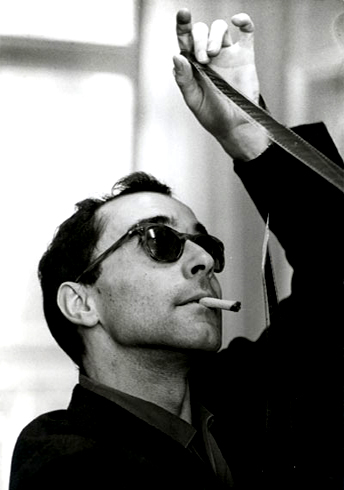What has been gained in access to information and communication during the Digital Age more than makes up for anything lost. But there have been losses. Process helps determine outcome, and the speed of digital removes significant time from effort. And precision means there are fewer errors and accidents, those things that birth genius. If method is faster, is the result naturally speeded up as well? From Richard Brody’s 2000 New Yorker profile of Jean-Luc Godard:
“I began by asking him about his most recently released feature film, For Ever Mozart, from 1996, a bitter fantasy about art and mourning. In it, three young French people with lofty ideas but idle hands take off for Sarajevo to put on a play and are killed in Bosnia by paramilitary thugs. One of the victims is the daughter of an old French director who has been stalled in his work; in his grief, he finds the will to create.
Typically, Godard was not satisfied with the film. ‘It wasn’t very good,’ he said. ‘The actors aren’t good enough, and things remained too theoretical.’ Godard’s complaint about his movie led to a complaint about young actors today: that even unknowns, inundated with media hype, comport themselves like stars and are ‘less available’ to direction: ‘They think they know what to do, by the fact that they’ve been chosen. They have no doubt. Doubt no longer exists today. With digital, doubt no longer exists.’
This abrupt switch from the sociological to the technological is typical of Godard’s conversation: his sentences, like his films, are always soaring into abstractions, or breaking off, pivoting on an instant of silence to change direction. ‘With digital, there is no past,’ he continued. ‘I’m reluctant to edit on these new so-called ‘virtual’ machines, these digital things, because, as far as I’m concerned, there’s no past. In other words, if you want to see the previous shot, O.K., you do this’—he tapped the table like a button—’and you see it at once. It doesn’t take any time to get there, the time to unspool in reverse, the time to go backward. You’re there right away. So there’s an entire time that no longer exists, that has been suppressed. And that’s why films are much more mediocre, because time no longer exists.'”
Tags: Jean Luc-Godard, Richard Brody

